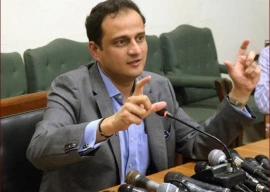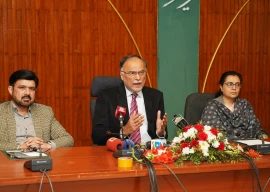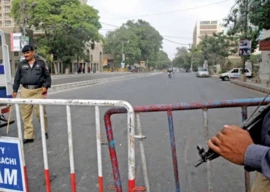
The stage is set for a dramatic hearing today.
Hours before a potentially decisive hearing of the National Reconciliation Ordinance (NRO) implementation case, the government bulldozed the controversial contempt of court amendment bill through the Senate on Wednesday.
With the bill already having been passed by the National Assembly, it now only needs the president’s signature to officially become law – a move that is expected at any time.
The bill will provide immunity from contempt proceedings to high office holders, including the prime minister, president, chief ministers, federal and provincial ministers as well as governors. The move is key given that Prime Minister Raja Pervaiz Ashraf’s reply is due today on whether he would be following the court directives on writing a letter to Swiss authorities to reopen graft cases against President Asif Ali Zardari and his late wife, former prime minister Benazir Bhutto. The cases had been closed earlier under the controversial NRO, which was struck down by the court as void ab initio in 2009.
Premier Ashraf’s predecessor, Yousaf Raza Gilani, was disqualified and unseated from prime ministership after being found in contempt because of his refusal to comply with these orders. Many predicted a similar fate for his successor – a fear that is seen to be the cause of the rush to pass the new contempt law.
The Supreme Court will take up the case today with a five-member larger bench, constituted last week, hearing the matter. At the last hearing on June 27, a three-member bench headed by Justice Nasirul Mulk, stated in its written order: “… the new prime minister was elected last week and we trust him that he will honour the direction given by this court. In the meantime we direct the attorney general of Pakistan (Irfan Qadir) to seek instructions from the prime minister and inform the court on the next date of hearing (July 12)”.
The larger bench will be headed by Justice Asif Saeed Khosa and comprise Justice Ejaz Afzal Khan, Justice Ejaz Ahmed Chaudhry, Justice Gulzar Ahmed and Justice Muhammad Ather Saeed.
Senate proceedings
The bill, presented by Law Minister Farooq Naek, wasn’t passed without plenty of dissent in the Senate. Not only did the opposition protest vociferously and boycott the session, there was rumblings of dissent by the Pakistan Peoples Party (PPP)’s own: most notably Senator Aitzaz Ahsan, the ruling party’s legal eagle and the counsel for the prime minister in the National Reconciliation Ordinance (NRO) implementation case.
“The government should review the draft of the bill as the law has been made in haste and could be harmful for the government,” said Senator Aitzaz during the Senate proceedings. “The proposed law is giving immunity to the president and the prime minister; but we must not forget that the situation will change when the party will be sitting in the opposition.”
However, Aitzaz also hastened to laud the gist of the bill, saying that it balances the power of the judiciary.
The opposition, on the other hand, was not in two minds. While taking part in the general debate, Leader of the Opposition Ishaq Dar said that the bill was mala fide, and amounts to lowering the prestige of parliament. He demanded that the bill should be withdrawn immediately otherwise the opposition will take “appropriate action” to ensure that the bill doesn’t stay on the statute books even if it becomes an act.
Pakistan Muslim Legaue-Nawaz (PML-N)’s Raja Zafarul Haq said his party strongly opposes the bill and awaits its annulment by the court. The bill has already been challenged in the Supreme Court for being contradictory to the Constitution.
The law minister defended the government’s move, saying “the bill is not against the judiciary and parliament has full right to legislate under the Constitution.” Naek, however, welcomed the opposition’s criticism, terming it the ‘beauty of democracy’.
(Read: Unseemly haste)
Published in The Express Tribune, July 12th, 2012.
COMMENTS (9)
Comments are moderated and generally will be posted if they are on-topic and not abusive.
For more information, please see our Comments FAQ


1727142053-0/Jacob-Erodi-(3)1727142053-0-165x106.webp)




















Judiciary and Executive stand face to face, wrestling is expected,who would be the winner Allah Almighty knows.
We,as a nation, passing through a long dark tunnel there is no light at the end of it.
In name of demlocrecy and supermacy of parialment present rigem did every possible wrong what teh can thaught. Comtempt of court act of 2012 is also a very bad act did by corruption house(parliament) every one can watch what speed shown for geting wrong object with heavy cost. Wrong persons can not do one single right. Saad Shibli Asc
Another bill that makes politicians above the law. All the fools supporting this bill in this forum should have their head examined.
No real justification for a new date for hearing. These are all delaying tactics of this corrupt Government. None of the PPP leaders has the integrity and moral courage to against their political masters dictates. The court should not wait till eternity. A judicial commission may be formed and should be ordered by the court to write letter to the Swiss authorities.
The country is not facing any crisis due to 'contempt bill' issue.Then why so much hue and cry on the subject.This only proves that we have priorities wrong and real issues being put under the carpet intentionally or our lack of understanding of the real issues which inturn is because of no love for the country
Thank You PPP Govt for balancing the Powers of Judiciary!
Dear Chief Editor
As you know that the constitution of 1973 was given by Mr. Zulfiqar Butto the then Prime Minister. In the constituion Mr. ZulfiqarAli Butto has mentioned Cotempt of Court section in his Constitution. Since the Party is acting on the constitution of Mr. Zulfiqar Ali Bhutto then why the present government is amending this section of Cotenmpt of court according to their own need. Is it correct or not the court will decide.
Geo and judges are running and ruining our country.
Mr Aitzaz Ahsan is among one of the last lawyers of any repute left who still try to justify highly partisan and controversial judicial practices of our current SC. One reason is that he is a practicing lawyer, so he does not find fit to cross certain limits. The other reason is that he is a kind of person who tries to find common grounds and strives for some sought of reconciliation among conflicting parties. But the most important reason is that he was the most central figure in the movement for the restoration of judges. That being his greatest achievement of political life, he does not want to concede that this movement brought to life an adventurous judiciary instead of the promised rule of law.